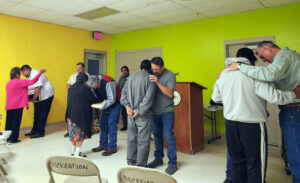
NASHVILLE (BP) — A United Nations report calling for “unprecedented” changes in energy use to limit climate change is unnecessarily alarmist and seems informed by a non-biblical view of human life, say a Southern Baptist climate scientist and a seminary president.
“Look at the real data,” said John Christy, a former lead author for the U.N. Intergovernmental Panel on Climate Change (IPCC). “Remember that human life is precious. And thus providing access to [energy sources] that enhance human life is really the moral track to take here. I just wouldn’t be too excited about these reports from government entities like the United Nations.”
The IPCC released a report Oct. 7 recommending governments cut carbon emissions in a manner that would limit global temperature increases to 1.5 degrees Celsius. Such cuts would require “far-reaching” and “unprecedented” modifications of human society, according to the report, but would limit sea-level rise, Arctic ice melting and coral reef reduction.
Among changes required to meet the 1.5-degree goal, according to the report:
— Renewable sources would have to supply at least 70 percent of the world’s electricity by 2050.
— Coal use to produce electricity would have to be virtually eliminated.
— At least 1.2 billion acres of pastureland and food crops for humans and animals would have to be converted to grow crops designated for energy use and trees that store carbon.
“We’ve delivered a message to the governments,” Jim Skea, co-chair of the IPCC panel that produced the report, said according to The Washington Post. “It’s now their responsibility … to decide whether they can act on it.”
R. Albert Mohler Jr., president of Southern Baptist Theological Seminary, said the IPCC’s suggested path forward “isn’t really a serious proposal” because “the people who came up with this report and the people who are reporting about the report are flying on airplanes, and they are driving in cars, and they are using all the artifacts” of the Industrial Revolution which the report implies should be scaled back.
The report has some scientific credibility, Mohler said Oct. 9 on his podcast The Briefing. But “there is a deep anti-humanism that runs through so much of the ecological movement” and motivates proposals to protect the environment at the expense of human well-being.
God’s mandate to humans in Genesis 1:28 calls them to both care for creation and to harness it for human flourishing, Mohler said, not return to pre-Industrial Revolution ways of life.
Christy, distinguished professor of climate science at the University of Alabama in Huntsville and a former Southern Baptist missionary, told Baptist Press scientists generally agree the earth is warming and that humans have played some role in the warming. But “no one knows the percentage of warming that may be due to greenhouse gases,” though “in our research it doesn’t look like much.”
In addition, the effects of warming are less significant than is sometimes portrayed, Christy said, noting God made the world “pretty tough.”
“When you just look at real-world data,” Christy said, “you don’t find the catastrophic changes occurring” claimed by some environmentalists. Even the IPCC “has to admit tornadoes actually have declined in the United States in the last 60-70 years. Atlantic hurricanes actually have declined in the last hundred years.”
The world should continue to burn fossil fuels but “make sure the poisons don’t go into the atmosphere, like the sulfur dioxides and the nitrogen oxides,” Christy said.
As a former missionary in Africa, Christy said he has seen how energy can improve the lives of the world’s poor — which is more important than advancing a scientifically unfounded agenda.
“When you’ve lived in a place like Africa, you know that life without energy is brutal and short,” Christy said. “The drive you should have if you have a moral sense about yourself is that you would want to provide energy for people who don’t have it, because energy is a key factor in creating a longer and better life for the billion poor people who don’t even have electricity.”
A 2007 Southern Baptist Convention resolution “on global warming” urged Southern Baptists “to proceed cautiously in the human-induced global warming debate in light of conflicting scientific research.”
The resolution also stated, “We consider proposals to regulate CO2 and other greenhouse gas emissions based on a maximum acceptable global temperature goal to be very dangerous, since attempts to meet the goal could lead to a succession of mandates of deeper cuts in emissions, which may have no appreciable effect if humans are not the principal cause of global warming, and could lead to major economic hardships on a worldwide scale.”

















